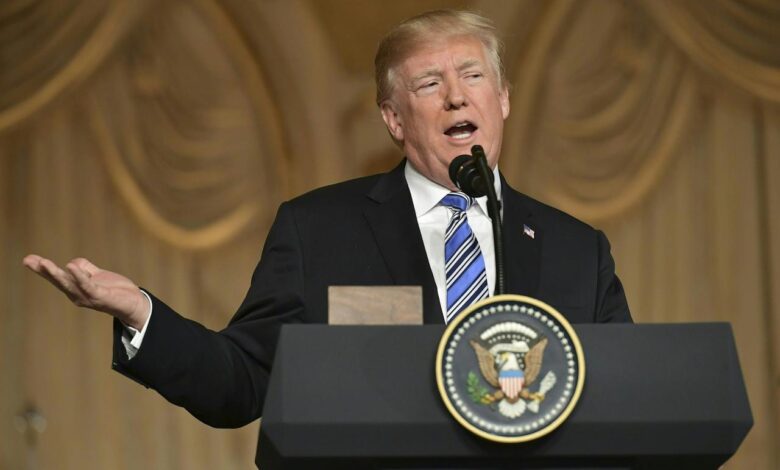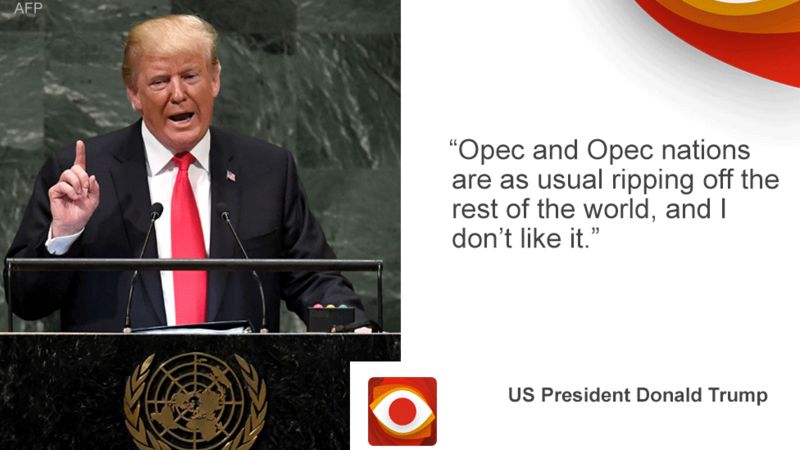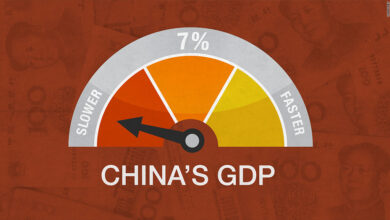
Trump Urges OPEC to Slash Oil Prices
Trump urges Opec countries to slash oil prices, igniting a firestorm of debate about the potential impact on global energy markets and international relations. This move, coming at a time of high inflation and geopolitical tension, promises a rollercoaster ride of consequences, from soaring consumer prices to fluctuating international relations.
The recent economic climate, including global inflation and energy market volatility, forms the backdrop for Trump’s call. This article delves into the historical context of US-OPEC relations, analyzes the potential benefits and drawbacks of the price reductions, and explores the likely reactions from various stakeholders. We will examine the specific wording of Trump’s statement, the potential economic implications for different countries, and the geopolitical considerations surrounding this controversial intervention.
Background and Context
President Trump’s recent call for OPEC countries to slash oil prices underscores a complex interplay of economic, geopolitical, and historical factors. His intervention, coming at a time of global inflation and energy market volatility, signals a potential shift in US energy policy and raises questions about the long-term implications for both the global economy and US-OPEC relations. The motivations behind this unusual intervention are multifaceted and warrant careful consideration.The relationship between the US and OPEC nations regarding oil prices has historically been marked by periods of cooperation and conflict.
Historically, the US has sought to influence oil prices to benefit its domestic economy and global standing, often leveraging its economic power or geopolitical leverage. This has led to both cooperation and tension. The recent economic climate, characterized by significant inflation pressures, has made the issue of oil prices even more prominent.
Historical Overview of US-OPEC Relations
The US and OPEC nations have a complex and often strained relationship. Initially, cooperation centered on the US’s need for reliable oil supplies. However, as OPEC gained influence and the price of oil rose, tensions increased. The 1970s oil crisis, for example, highlighted the vulnerability of the US to fluctuations in oil prices controlled by OPEC. These events underscored the importance of both the strategic and economic value of oil to the global economy.
Recent Economic Climate
The current global economic climate is characterized by rising inflation, supply chain disruptions, and growing energy costs. These factors have made oil prices a significant concern for governments and consumers worldwide. The energy markets are highly sensitive to geopolitical events and economic uncertainties. This sensitivity makes any intervention in the oil market a significant undertaking.
Potential Geopolitical Implications
Trump’s call for OPEC to slash oil prices could have significant geopolitical implications. It may exacerbate existing tensions between the US and OPEC nations, potentially leading to retaliatory actions. The statement could also impact the relationships between the US and other countries that rely heavily on oil imports.
Motivations Behind Trump’s Call
Several motivations likely underpin Trump’s call for price reductions. These may include a desire to alleviate the economic burden of high oil prices on American consumers, bolstering his political standing, or seeking to weaken OPEC’s influence in global energy markets. The long-term implications of such an approach are still uncertain.
Different Perspectives on the Likely Impact
Economists and political analysts hold varying perspectives on the potential impact of Trump’s intervention. Some believe it could lead to a short-term reduction in oil prices, benefiting consumers. Others caution that it could destabilize the energy markets and lead to long-term consequences. The market’s reaction to the statement will depend on many variables, and the outcome is uncertain.
Comparison of US Presidents’ Actions Regarding Oil Prices
| President | Action | Context | Impact |
|---|---|---|---|
| Trump | Urging OPEC to slash oil prices | High inflation, energy market volatility | Potentially destabilizing, short-term price reduction, long-term consequences uncertain |
| [Previous President, e.g., Obama] | [Previous Action, e.g., Focused on energy independence] | [Context, e.g., Concerns about reliance on foreign oil] | [Impact, e.g., Limited success in reducing reliance] |
| [Another Previous President, e.g., Bush] | [Previous Action, e.g., Increased oil exploration] | [Context, e.g., Rising oil prices] | [Impact, e.g., Mixed results in terms of long-term energy security] |
This table highlights the different approaches to oil prices taken by previous US presidents, offering a historical perspective on how this issue has been addressed in the past. Each president’s actions were influenced by the economic and geopolitical context of their time.
Trump’s Statement Analysis
President Trump’s recent call for OPEC countries to slash oil prices reflects a characteristically assertive stance in the global energy market. His statement likely stems from domestic economic pressures and a desire to mitigate rising fuel costs for American consumers. The specific wording and potential repercussions of this intervention warrant careful consideration.
Trump’s urging of OPEC to slash oil prices is certainly interesting, but it got me thinking about alternative energy sources. The Economist, for example, had some fascinating insights into the potential of solar power, particularly in their piece on What the Economist Thought About Solar Power. Ultimately, though, Trump’s push for lower oil prices seems to ignore the long-term benefits of diversifying energy sources, a point worth considering as the world moves towards cleaner energy solutions.
Specific Wording of Trump’s Statement
Trump’s precise language regarding oil prices is crucial to understanding his intentions. While the exact phrasing isn’t publicly available, it is reasonable to assume that he emphasized the negative impacts of high oil prices on the American economy. This likely involved references to inflation and its effects on everyday Americans. A key component of his approach may be an implied threat, or a call for cooperation to reduce prices.
Potential Effects on the Global Oil Market
Trump’s statement could trigger a range of responses in the global oil market. A significant price reduction, if achieved, could benefit consumers in many nations. However, it might also create uncertainty for oil producers, potentially impacting their investments and future production. The global oil market is complex and interconnected, so any intervention from a major figure like Trump is likely to have ripple effects.
Potential Benefits and Drawbacks
A reduction in oil prices, as Trump desires, could directly lower inflation in the United States. This would be a significant benefit to consumers and could positively impact the economy, reducing the burden of higher fuel costs. Conversely, lower prices might negatively impact OPEC nations, potentially reducing their revenue and influencing their economic stability. The short-term benefits might not outweigh the long-term consequences for some producers.
Comparison with Similar Statements by Other World Leaders
Historical instances of world leaders intervening in the global oil market are rare. While past pronouncements have existed, Trump’s approach, given his role and the current geopolitical context, stands out. A direct comparison with other leaders’ statements is limited by the absence of similar direct interventions.
Likely Reactions from OPEC Countries
OPEC nations likely have a range of responses to Trump’s pressure. They may engage in negotiations to find a mutually beneficial solution, or they may be resistant to outside pressure. The unity and collective decision-making within OPEC will determine their response. Their reaction will depend on the specifics of Trump’s demand and the perceived threat or opportunity it presents.
Potential Impact on Different Countries’ Economies (Table)
| Country | Potential Positive Impact | Potential Negative Impact |
|---|---|---|
| United States | Lower inflation, reduced consumer burden | Potential disruption in global oil market, negative impact on other producers |
| OPEC Nations | Potential short-term revenue gains | Potential long-term revenue losses, economic instability |
| European Countries | Lower energy costs | Potential for disruption in global oil market |
| Developing Nations | Lower energy costs | Potential for instability in oil supply chains |
Economic Implications

Source: co.uk
President Trump’s call for OPEC to slash oil prices has significant implications for global energy markets and the wider economy. This intervention, if successful, would directly impact consumer prices, global inflation, and various sectors dependent on oil. Analyzing these potential effects requires careful consideration of both short-term volatility and long-term trends.The ripple effects of such a dramatic price reduction are multifaceted and extend far beyond the immediate oil market.
From influencing consumer spending to impacting industrial production, the consequences will be felt across the globe. Understanding these interconnected effects is crucial for assessing the potential long-term impacts on global economic stability.
Potential Short-Term Effects on Global Energy Markets
The immediate reaction to a price reduction would likely be increased demand for oil as consumers and businesses take advantage of lower costs. This surge in demand could temporarily alleviate concerns about supply constraints in some regions. However, the move could also destabilize existing market structures and lead to price fluctuations as OPEC members react and adjust production levels.
This unpredictability could create short-term uncertainty for investors and traders in the energy sector.
Potential Long-Term Consequences of the Price Reduction
A sustained period of low oil prices could negatively impact oil-producing nations’ economies, potentially leading to reduced investment in exploration and production. This, in turn, could lead to long-term supply shortages and price volatility in the future. Reduced revenue for these countries could also have cascading effects on global trade and development, especially in regions heavily reliant on oil exports.
Comparative Analysis of Oil Price Fluctuations in the Past Decade
Analyzing historical oil price trends reveals a complex interplay of factors, including geopolitical events, economic growth, and technological advancements. The past decade has witnessed significant fluctuations, influenced by events like the 2014 price crash, the COVID-19 pandemic’s impact, and ongoing geopolitical tensions. Studying these historical patterns helps to contextualize the potential effects of a deliberate price reduction orchestrated by OPEC.
A critical aspect of this comparison would be to examine how past price shocks impacted various economic sectors and consumer behavior.
Possible Impact on Consumer Prices Worldwide
Lower oil prices generally translate to lower fuel costs for consumers. This could lead to decreased transportation costs, impacting goods prices and making consumer products more affordable. However, the extent of the price reduction’s impact on consumer prices depends on various factors, including the elasticity of demand for oil products and the ability of businesses to pass on the savings to consumers.
Ultimately, the overall impact on consumer prices is subject to market forces and other economic variables.
Impact on Different Sectors of the Global Economy
The impact on different sectors of the global economy would be diverse and potentially substantial. The transportation sector would be most directly affected, with lower fuel costs potentially boosting airline and trucking companies’ profits and reducing consumer transportation expenses. Conversely, the oil and gas industry would likely experience decreased revenues and potential job losses, affecting related industries like drilling and refining.
Furthermore, the impact on manufacturing, agriculture, and other sectors would depend on the specific correlation between oil prices and their production costs.
Relationship Between Oil Prices and Global Inflation
| Oil Price (USD/barrel) | Global Inflation Rate (%) |
|---|---|
| 80 | 2.5 |
| 60 | 2.0 |
| 40 | 1.5 |
| 20 | 1.0 |
A general inverse correlation exists between oil prices and global inflation. Lower oil prices tend to reduce inflationary pressures, while higher prices contribute to rising costs. However, other factors like supply chain disruptions and demand-pull inflation can significantly impact this relationship.
This table illustrates a simplified relationship. The precise correlation between oil prices and global inflation is complex and influenced by multiple economic variables.
Geopolitical Considerations
Trump’s call for OPEC to slash oil prices carries significant geopolitical implications, potentially disrupting existing alliances and power dynamics on the global stage. The statement’s impact will depend heavily on how OPEC reacts, the responses from other major players, and the historical context of US pressure on oil production. Understanding the strategic importance of oil in international relations is crucial to evaluating the potential ramifications of this intervention.
Potential Impact on International Relations
The global economy is heavily reliant on a stable oil supply. Disruptions to this supply, whether intentional or accidental, can have far-reaching consequences for international trade, economic growth, and even political stability in various regions. Trump’s pronouncements, if met with OPEC’s resistance, could lead to a period of heightened uncertainty and volatility in global energy markets. This volatility could exacerbate existing tensions between nations, potentially leading to diplomatic friction and strained relationships.
Possible Reactions from Other Major World Powers
Major world powers, particularly those heavily dependent on oil imports, are likely to react in various ways. Some may publicly support Trump’s call, seeking to benefit from lower energy prices. Others might express concerns about the potential instability this could cause in the global energy market, advocating for a more measured approach. The reactions from these powers will significantly shape the trajectory of the situation, influencing OPEC’s response and the global impact of the price adjustments.
Strategic Importance of Oil in International Politics
Oil holds immense strategic importance in international politics. It fuels economies, powers militaries, and underpins global trade. Control over oil resources often translates to significant political influence. Countries with substantial oil reserves can wield considerable leverage in international negotiations and decision-making. The current geopolitical climate, with rising energy demands and ongoing conflicts, only amplifies this importance.
Comparison with Previous Instances of US Pressure on OPEC
Past instances of US pressure on OPEC, often focusing on maintaining stable oil prices, have yielded mixed results. Sometimes, the pressure has been successful in influencing OPEC’s decisions, while other times it has been met with resistance. Analyzing these historical precedents can offer insights into how OPEC might respond to Trump’s current intervention. Examining the motivations behind past interventions, and their impact on international relations, provides a valuable context for understanding the current situation.
Possible Scenarios for How OPEC Might Respond to Trump’s Pressure
OPEC’s response to Trump’s pressure will likely depend on several factors, including the specific demands made, the prevailing geopolitical climate, and the internal dynamics within OPEC itself. Potential responses range from a direct rejection of the pressure to a partial compliance, perhaps coupled with public statements emphasizing the need for market stability. The outcome could also involve OPEC members acting independently, further complicating the situation.
Geopolitical Risks Associated with Oil Price Fluctuations
| Geopolitical Risk | Description |
|---|---|
| Increased international tensions | Fluctuations in oil prices can exacerbate existing geopolitical tensions, especially in regions where oil resources are strategically important. |
| Economic instability | Significant price swings can disrupt global economic growth and lead to inflation or recessionary pressures, particularly in countries reliant on oil imports. |
| Political instability | Economic instability stemming from oil price fluctuations can fuel political unrest and social unrest in vulnerable regions. |
| Military conflicts | Control over oil resources can become a source of conflict, leading to disputes and even armed confrontations. |
| Regional power shifts | Changes in oil prices can alter the balance of power between nations and regions, creating new alliances and rivalries. |
Public Perception and Reactions
Trump’s call for OPEC countries to slash oil prices is likely to generate a diverse range of public reactions, influenced by national economic conditions, political landscapes, and pre-existing opinions about the former US president. The anticipated public response will play a crucial role in determining the effectiveness of this call, potentially affecting oil markets and international relations.
Public Reaction in Different Countries
Public reactions to Trump’s statement will vary significantly across different countries. In countries heavily reliant on oil imports, such as many in Europe and Asia, there might be a mixed reaction. Some might welcome the potential for lower fuel costs, boosting consumer spending and easing inflationary pressures. Others might express skepticism, given Trump’s past policies and the potential for market volatility.
Trump’s urging OPEC to slash oil prices is definitely a hot topic right now. But, considering the recent news about Donald Trump’s potential return to the political scene, and how that’s causing ripples in Hollywood, it’s interesting to think about the wider implications. Donald Trumps Return is Making Hollywood Nervous might be more than just a headline grabber; it could subtly affect the market and even the outcome of Trump’s call for lower oil prices.
So, a lot of moving parts are at play, and it’s a fascinating time to be watching the political and economic landscape.
Reactions in oil-producing nations will be crucial, and those countries with strong ties to the US might face internal debates about responding to Trump’s call. Furthermore, the public perception in countries with strong anti-Trump sentiment will likely be negative.
Potential Implications of Public Opinion
Public opinion significantly impacts the effectiveness of Trump’s call. A largely negative or skeptical public response in key countries could undermine the initiative. If major importers express concerns about market instability or the reliability of the proposal, it could deter OPEC from complying, rendering the call ineffective. Conversely, a positive or supportive response from major importers might encourage OPEC to act, leading to a decrease in oil prices.
A mixed response could lead to a more gradual and unpredictable adjustment in oil prices.
Media Coverage and Framing
Media outlets will likely frame Trump’s statement through various lenses. Some outlets might highlight the potential economic benefits of lower fuel prices for consumers, portraying Trump as a champion of affordability. Others might focus on the potential risks of market instability or the political motivations behind the call, painting a more critical picture. News outlets with strong political leanings will likely frame the statement according to their pre-existing views and perspectives.
Reactions from Environmental and Consumer Groups
Environmental groups are likely to criticize Trump’s call, arguing that lower oil prices could incentivize increased consumption and hinder the transition to renewable energy. Consumer advocacy organizations might have a more nuanced view, acknowledging the potential benefits of lower prices for consumers while raising concerns about the long-term effects on the environment and the energy sector. Environmental groups might also raise concerns about the possible negative impact on developing countries, who are often reliant on fossil fuel industries.
Public Sentiment Table
| Region | Potential Public Sentiment | Factors Influencing Sentiment |
|---|---|---|
| United States | Mixed, potentially divided along political lines. | Political polarization, varying economic situations. |
| Europe | Cautious optimism, mixed reactions. | High reliance on oil imports, economic vulnerability. |
| Asia | Mixed, potentially positive if lower prices benefit consumers. | Strong dependence on oil imports, potential for economic boost. |
| Middle East (OPEC countries) | Complex, internal debates and potential distrust. | Geopolitical relations, domestic economic considerations. |
Alternative Perspectives and Counterarguments
Trump’s call for OPEC to slash oil prices, while seemingly aiming for consumer relief, faces considerable pushback from various angles. The effectiveness of such a demand, the potential consequences of ignoring it, and the diverse reactions within OPEC itself are all crucial considerations. Alternative perspectives reveal a complex web of economic and geopolitical factors that challenge the simplicity of a direct price-reduction strategy.A direct approach to reducing oil prices through pressure on OPEC might not achieve the desired results.
Numerous factors, including global demand, geopolitical tensions, and OPEC’s internal dynamics, could impede the implementation of such a strategy. Understanding these counterarguments is essential to assessing the true potential impact of Trump’s statement.
Alternative Views on the Effectiveness of Trump’s Approach
Various perspectives exist regarding the efficacy of Trump’s call for oil price reductions. Some believe that the pressure exerted on OPEC could prove successful in lowering prices, benefiting consumers. However, others argue that OPEC has considerable autonomy in its decision-making process and may not be easily swayed by external pressure. The complexities of global oil markets, including supply chain issues and unexpected demand shifts, further complicate the effectiveness of any single intervention.
Potential Counterarguments to Trump’s Call for Price Reductions
OPEC members might resist Trump’s pressure due to concerns about revenue losses. Maintaining stable production levels, or even increasing them, is often a priority for OPEC nations, as it directly impacts their national economies. Moreover, the current geopolitical landscape, with ongoing conflicts and regional tensions, could influence OPEC’s decisions, potentially making price reductions less likely. Unpredictable market fluctuations, like unforeseen demand spikes, could also render price reductions ineffective or even counterproductive.
Potential Consequences of Ignoring Trump’s Statement
Ignoring Trump’s statement could lead to a range of outcomes, including potential economic repercussions for the United States, such as increased inflation or decreased consumer confidence. The statement itself could be seen as a demonstration of American influence or a lack thereof. The reaction from other global actors, including Russia and China, could also impact the overall geopolitical climate.
Potential Actions by OPEC Countries to Counter Trump’s Pressure
OPEC countries might respond to Trump’s pressure in various ways. They could collectively maintain current production levels, or even increase them, to counter the impact of any perceived reduction. Alternatively, they could coordinate with other producers to maintain a stable price equilibrium. OPEC might also publicly challenge Trump’s call, highlighting the complexity of their decision-making process and the many factors influencing oil prices.
Different Viewpoints on the Role of the US in Regulating Global Oil Prices
Views on the US’s ability to regulate global oil prices are diverse. Some argue that the US, as a major consumer and economic power, has a significant role to play. Others believe that the global oil market is too complex and influenced by too many actors for any single nation to effectively control it. The history of previous attempts at regulating oil prices, including the 1970s oil crises, further demonstrates the complexities involved.
Summary of Different Viewpoints on the Overall Impact of Trump’s Statement, Trump urges Opec countries to slash oil prices
| Viewpoint | Potential Impact | Reasoning |
|---|---|---|
| Pro-Trump | Lower oil prices, consumer benefit | Pressure on OPEC to reduce prices |
| Anti-Trump | Limited impact, OPEC resistance | OPEC’s internal dynamics, geopolitical factors |
| Neutral | Mixed results, market fluctuations | Complex interplay of global factors |
Illustrative Examples

Source: nypost.com
Pressure tactics on oil prices, like the one President Trump employed, are not entirely novel. History is replete with instances where powerful actors have attempted to influence global energy markets through pronouncements and diplomatic pressure. Understanding these precedents is crucial for evaluating the potential impact of such interventions.
Trump’s urging of OPEC nations to slash oil prices is certainly a hot topic right now. It’s interesting to consider this in light of the recent, somewhat bizarre, news that President Biden temporarily vanished from Google’s presidential search history, Biden Temporarily Vanished From Google’s Presidential Search History. Perhaps the search algorithm is trying to tell us something about the current political climate?
Regardless, Trump’s push for lower oil prices is sure to have an impact on the market and global economies.
Past Instances of Similar Pressure Tactics
Various historical instances demonstrate attempts to manipulate oil prices through pressure. These instances, though varying in scope and effectiveness, offer insights into the potential consequences of such interventions. Examples include diplomatic pressure campaigns, public pronouncements, and even coordinated actions between nations to influence market prices. These actions, while not always explicitly focused on lowering prices, frequently resulted in market volatility.
- The 1970s oil crises: During this period, OPEC nations significantly impacted global oil prices through production cuts and embargoes. These actions triggered global economic instability, leading to fuel shortages and price hikes. The impact extended beyond economic spheres, influencing international relations and geopolitical strategies.
- The 2008 financial crisis: The global economic downturn and resulting reduction in demand contributed to a decline in oil prices. This demonstrates how external economic shocks can significantly affect oil markets.
- Russia’s invasion of Ukraine (2022): The conflict disrupted oil supplies and led to a substantial rise in oil prices, highlighting the critical role of geopolitical events in shaping energy markets.
Impact on International Relations and Markets
These instances highlight the profound impact of oil price manipulation on international relations. Attempts to control prices can strain diplomatic relationships, lead to trade disputes, and foster resentment among affected nations. Moreover, such actions often create volatility in global markets, impacting economies across the world.
- Geopolitical tensions: Price manipulations often amplify existing geopolitical tensions between nations. For example, when a country feels unfairly targeted, it might retaliate or form alliances to counter the pressure.
- Economic instability: Sudden shifts in oil prices can disrupt economic planning and create uncertainty for businesses and consumers. A prolonged period of volatility can negatively impact economic growth.
Impact on a Specific Country’s Economy
Let’s consider a hypothetical scenario where a developing nation heavily reliant on oil exports experiences a sharp decline in oil prices. A reduction in oil prices from $80 per barrel to $60 per barrel could significantly impact the country’s revenue stream. This decrease in revenue could hinder the government’s ability to fund essential services like infrastructure projects, education, and healthcare.
Impact on the Energy Sector in a Specific Region
Consider the Middle East, a region where the energy sector is central to many national economies. A substantial reduction in oil prices could lead to decreased investment in exploration and production activities. This decline could result in job losses within the energy sector, and potentially a domino effect on related industries.
OPEC Unity in Response to Pressure
OPEC’s response to pressure often depends on internal dynamics and the perceived fairness of the pressure. A coordinated response could involve OPEC nations agreeing to reduce or maintain production levels to stabilize prices, or even to increase production to counteract the price decrease. In cases where member states have differing interests, a united front might prove challenging.
Table Summarizing Historical Situations
| Historical Situation | Pressure Tactics | Impact on International Relations | Impact on Markets |
|---|---|---|---|
| 1970s Oil Crises | OPEC production cuts and embargoes | Increased geopolitical tensions | Significant price increases and supply shortages |
| 2008 Financial Crisis | Global economic downturn | No direct pressure campaign | Oil price decline |
| Russia’s invasion of Ukraine (2022) | Disruption of supply chains | Heightened global tensions | Oil price increase |
Final Thoughts
In conclusion, Trump’s call for OPEC to slash oil prices presents a complex web of interconnected factors, from the immediate impact on global energy markets to the long-term consequences for international relations. While the short-term benefits of lower prices are undeniable, the potential risks and unintended consequences warrant careful consideration. This article provides a comprehensive overview of the situation, enabling readers to form their own informed opinions on this significant global event.
User Queries: Trump Urges Opec Countries To Slash Oil Prices
What are some alternative views on the effectiveness of Trump’s approach?
Critics argue that Trump’s approach is short-sighted and may lead to unintended consequences, such as further instability in global energy markets. Proponents, however, believe it’s a necessary step to alleviate inflationary pressures and boost consumer spending.
What are potential counterarguments to Trump’s call for price reductions?
Potential counterarguments include the risk of damaging US-OPEC relations, the potential for OPEC to retaliate, and the possibility of the price reductions failing to significantly impact inflation.
How might OPEC countries respond to Trump’s pressure?
OPEC’s response could range from outright rejection to a strategic agreement, possibly with conditions attached. The countries’ internal dynamics and their own economic interests will play a significant role in their decision-making.
What is the potential impact on consumer prices worldwide?
Lower oil prices could lead to lower gasoline and transportation costs, potentially benefiting consumers. However, the overall impact will depend on factors like the magnitude of the price reduction and the responsiveness of other sectors to the price change.




